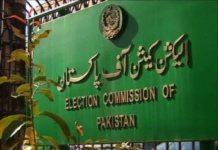The upcoming National Security Policy (NSP) that launches this Friday would reportedly focus on peace with immediate neighbours including India, without any set agreement on the Kashmir issue but also without compromising Pakistan’s interests in that regard.
An official who was part of the policy’s background briefing meeting, talked to the media about the various features of the upcoming NSP on Tuesday. The official said that with dialogue between India and Pakistan, enhanced economic relations could be achieved. Such was the focus of the NSP as Pakistan was not “seeking hostility with India for the next 100 years,” said the official.
The official further revealed that “economic security” was a central principle of the NSP but that did not imply that Pakistan’s interests would take a backseat. He identified the Kashmir issue as one such point of interest, stating that there was no bettering the situation with Indian Prime Minister Narendra Modi at the helm.
Relations between the long-time antagonistic states soured further after India backtracked on the special status given to Indian Occupied Jammu and Kashmir (IOJK) in 2019. The move saw a suspension of bilateral trade between India and Pakistan. The sliver of hope to better relations that emerged in February 2021 due to an agreed upon ceasefire along the Line of Control (Loc), also fell flat with no progress.
Speaking further about the NSP, the official said that it was the first time that the policy would incorporate internal security and foreign policy, stressing that only some aspect of the national security would be publicized.
Highlighting the devising of the document, the official said that the NSP took seven years to curate after work on it was initiated by then national security advisor Sartaj Aziz in 2014.
The official revealed that all relevant federal, provincial, military institutions and departments, other than the opposition were taken on board to devise the policy. He said that the policy fell under the purview of the executive’s responsibilities, but the opposition would have to unanimously agree with the policy for which it had to be brought to the table.
A few weeks ago, National Security Adviser Dr. Moeed Yusuf briefed the parliamentary committee on national security but the opposition sat out the session.
Moreover, the NSP would cover political instability, noted the official, adding that the militant and dissident groups were a concern the policy aimed to tackle as well. On that point, the NSP would reportedly bring forth a reconciliatory approach towards elements with whom it was possible to do so.
Internally, the new policy has come up with five key areas that include population/migration, health, climate and water, food security and gender mainstreaming.
The official also spoke about the policy’s implementation strategy as headed by the prime minister, who would review its headway monthly. The policy would have an annual review with room for revisions with any future government’s coming to power as well.







